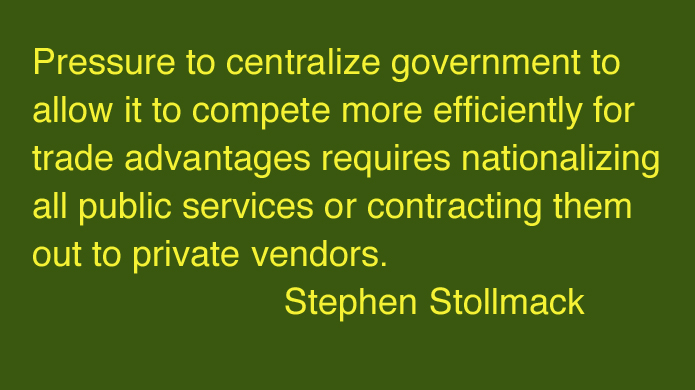Education and the Export of Jobs: Will All that is Public Become Private?

by Stephen Stollmack, Ph.D.
My life now seems to be on Fast-Track – so much more to learn about what’s going on in the world each day and more and more suspicion that the government has been hiding important things from us for years. Now that I am back to living alone, no longer having the responsibility of supporting a family, I am shocked at what I see. My sense of shame — for failing to follow and speak out against this trend towards less transparency and rampant secrecy – is what has motivated me to write this article.
President Obama’s 2008 primary fight against Hillary coincided with my coming out of the fog of married life and 2-3 years of drug abuse that dulled the pain and disappointment of separation and divorce. I began to recover my sense of responsibility to myself and the world by reading President Obama’s books and trying to figure out who this man was, while I struggled to understand his oppressive and inhuman education ‘reform’ policies with their emphasis on accountability, standardization and privatization. I read about and watched him in public appearances with his family and concluded that, while he seemed exceptionally smart and competent, he was also a well-meaning person.
I continued to support him, in the face of accusations that he was continuing his predecessor’s policies and wars. I have been profoundly disappointed about that and I am also disturbed at his failure to keep his promise to maintain a ‘transparent’ administration (among other things). I can see how he could have underestimated how difficult this would be given the fact that the functionality of all bureaucracies rests on the efficiency with which they withhold information from the public as well as from lower levels of management. Having worked for and contractually consulted to a number of federal agencies for 30-years, I knew first hand that information — what each bureaucrat knows about the ‘higher-up’s marching orders — determines his/her ability to survive and grow in his/her job.
I watched the President sign the TPA — a law that will assure passage of TPP, a trade agreement that will have profound and irreversible impacts on today’s and future generations with barely a squeak from the “free press.”
So, does TPA becoming law essentially mean TPP is a done deal? This internet article suggests not. It makes the point that Fast Track Trade Promotion Authority (TPA) does not prevent Congress from debating TPP provisions but it limits such debates and public comments to within 90-days of seeing it for the first time. At or before the 90-day limit, Congress MUST give the bill a straight up-or-down vote.
TPA was first codified into law by the Trade Act of 1974 (P.L. 93-618) to give the president more leeway to conduct negotiations, while assuring other participants that their negotiations could be to no avail if the US Congress decides to not ratify the agreement.
The main objections to TPA (and fears about TPP) have stemmed from the fact that past trade Education and the Export of Jobs: Will All that is Public Become Private? - Living in Dialogue:
